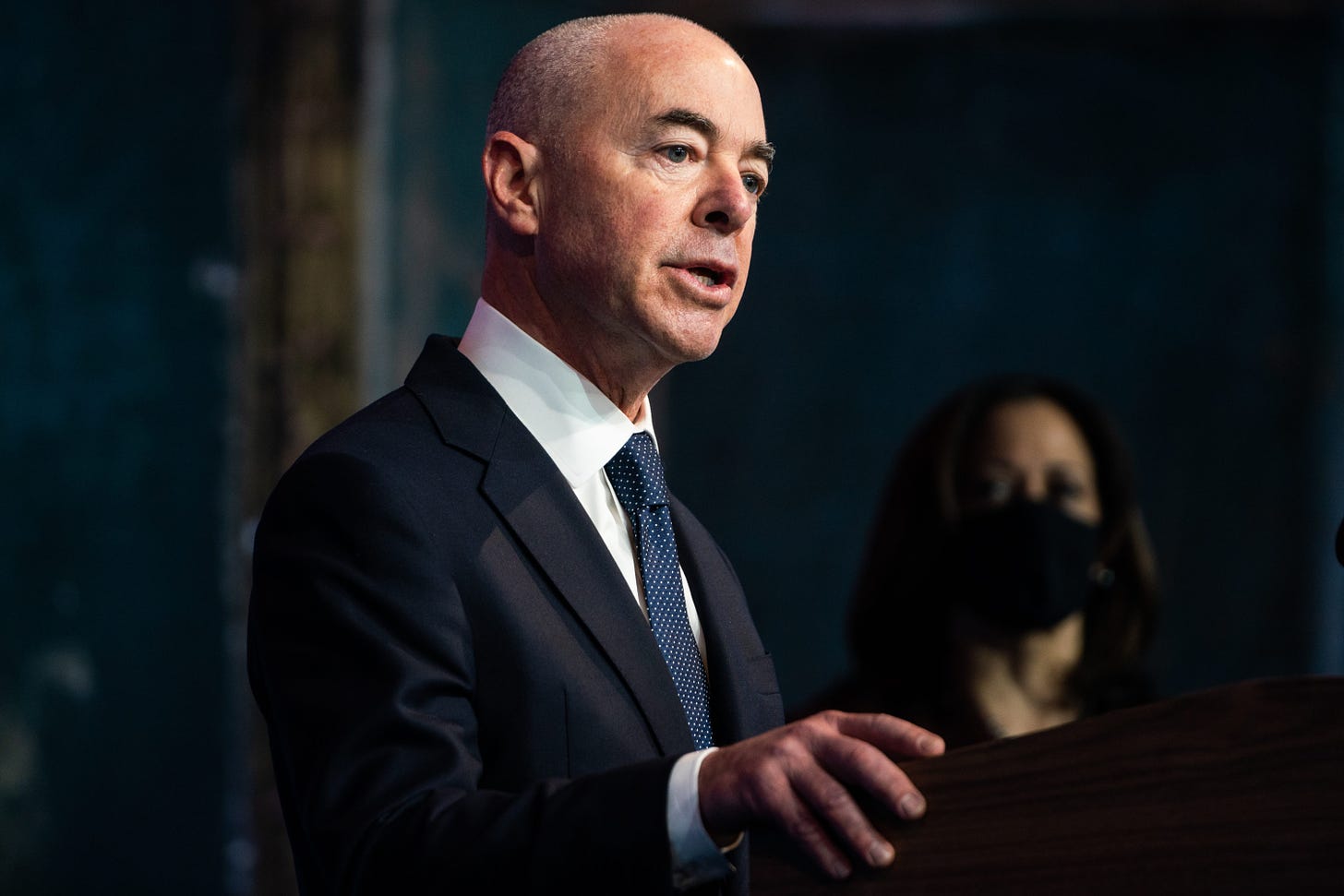By Blocking Biden’s DHS Nominee, Hawley Is Picking a Bigger Fight over Immigration
Alejandro Mayorkas is eminently qualified to lead the rudderless department, but objections over policy have delayed his confirmation.

Of all the agencies and departments damaged during the Trump administration, the Department of Homeland Security sustained perhaps the greatest and most prolonged assault. It has been nearly two years since the department had a Senate-confirmed secretary (Kirstjen Nielson), so it would stand to reason that senators would be anxious to confirm a nominee to bring order and legitimacy to that post. But already some Republicans are balking at confirming President Biden’s choice, Alejandro Mayorkas. Sen. Josh Hawley objected to bringing Mayorkas’ nomination to a quick vote, which required unanimous consent, and several Republican senators on the Homeland Security and Governmental Affairs Committee voiced concerns about Mayorkas during confirmation hearings this week.
This is an amazing turn of events given Mayorkas’ background: He’s been a federal prosecutor and deputy director of the Department as well as director of U.S. Citizenship and Immigration Services, having been previously confirmed by the Senate three times. He is also an immigrant, who knows from personal experience the privilege of citizenship. His parents fled communism in Cuba, bringing him to America as a child, where he learned first-hand the opportunity this country offers, in President Reagan’s words, “to anyone with the will and heart to get here.”
But Mayorkas the man is not the actual target of senators like Hawley, though they may try to tarnish him personally to achieve their objectives. Their opposition is to the Biden administration’s vision for a new era in immigration policy and enforcement. Even Sen. Hawley has admitted as much, saying, “Mr. Mayorkas has not adequately explained how he will enforce federal law and secure the southern border given President-elect Biden's promise to roll back major enforcement and security measures.” Translation: After four years of the Trump administration’s cruelty, incompetence, and disregard for the equal protection of the law, the Biden administration’s plan is thoughtful, measured, and in line with the values for which this nation is known. And Hawley can’t stand it.
President Biden signed an executive order on immigration policies and priorities and a memorandum to the Attorney General and Homeland Security Secretary on the Deferred Action for Childhood Arrivals (DACA) program soon after he was sworn in as president, but the administration is wisely aiming to achieve most of its immigration policy goals through legislation. Although the Supreme Court rejected the Trump administration’s effort to rescind the temporary protection for undocumented immigrants who had come to the United States as children, it did so largely on procedural grounds. More importantly, the original protection afforded by DACA gave recipients only a temporary reprieve from removal. The Biden proposal, if enacted, would give DACA enrollees the right to apply for permanent resident status immediately, with the opportunity to become citizens within eight years—provided they meet all the qualifications, including paying taxes, criminal background checks, etc. While a DACA bill by itself would likely garner bipartisan support, the odds of a comprehensive bill passing the Senate look dimmer.
That’s a shame. Immigration should not be a partisan issue. Ours is a country that has been built—from before its founding—by people born elsewhere. It wasn’t that long ago that Republican presidents and elected leaders embraced the Statue of Liberty as the symbol of American freedom and opportunity. Ronald Reagan did so during his presidential campaign in 1980 when he spoke in Lady Liberty's shadow of how and why immigrants came to America:
These families came here to work. They came to build. Others came to America in different ways, from other lands, under different, often harrowing conditions, but this place symbolizes what they all managed to build, no matter where they came from or how they came or how much they suffered.
In 2001, then-Sen. Orrin Hatch, a staunch conservatives from Utah, introduced the DREAM Act, which would have given legal status to immigrants brought here as children. Republican President George W. Bush repeatedly tried to get immigration reform passed, with support from a number of Republican senators, including Sen. Lindsay Graham, only to see those hopes dashed. Sen. Graham and Sen. Marco Rubio both participated in the bipartisan “Gang of Eight” trying to pass immigration reform in 2013, though now that President Biden is in office, neither man sounds receptive to the ideas they once championed.
The problem now is that too many Republicans of the Trump era had one concern on immigration—stopping it. While most of the rhetoric from Trump and his imitators focused on illegal border crossing and deporting those currently in the country illegally, the ultimate goal of hardliners in Congress and the Trump administration was to curtail, rollback, and even end certain categories of legal entry. Refugee and asylum programs were mothballed, applicants for permanent residence found themselves facing new impediments and delays, and visas available for temporary workers across a broad spectrum shrank. The Biden plan aims to reverse much of the disorder and outright hostility to immigration, but it will be a tall order to get bipartisan support given the history of the last two decades on this issue.
Perhaps Biden has taken inspiration from his predecessor, John F. Kennedy, who explained why America takes on difficult challenges:
not because they are easy, but because they are hard, because that goal will serve to organize and measure the best of our energies and skills, because that challenge is one that we are willing to accept, one we are unwilling to postpone, and one which we intend to win…
Biden’s moonshot will be bigger than immigration: It will be to forge a bipartisan compromise on the issue that, perhaps more than any other, has animated the populist-nationalist right ascendant in the Republican party. Getting Mayorkas confirmed over the objections of Sen. Hawley will be only the first step.



